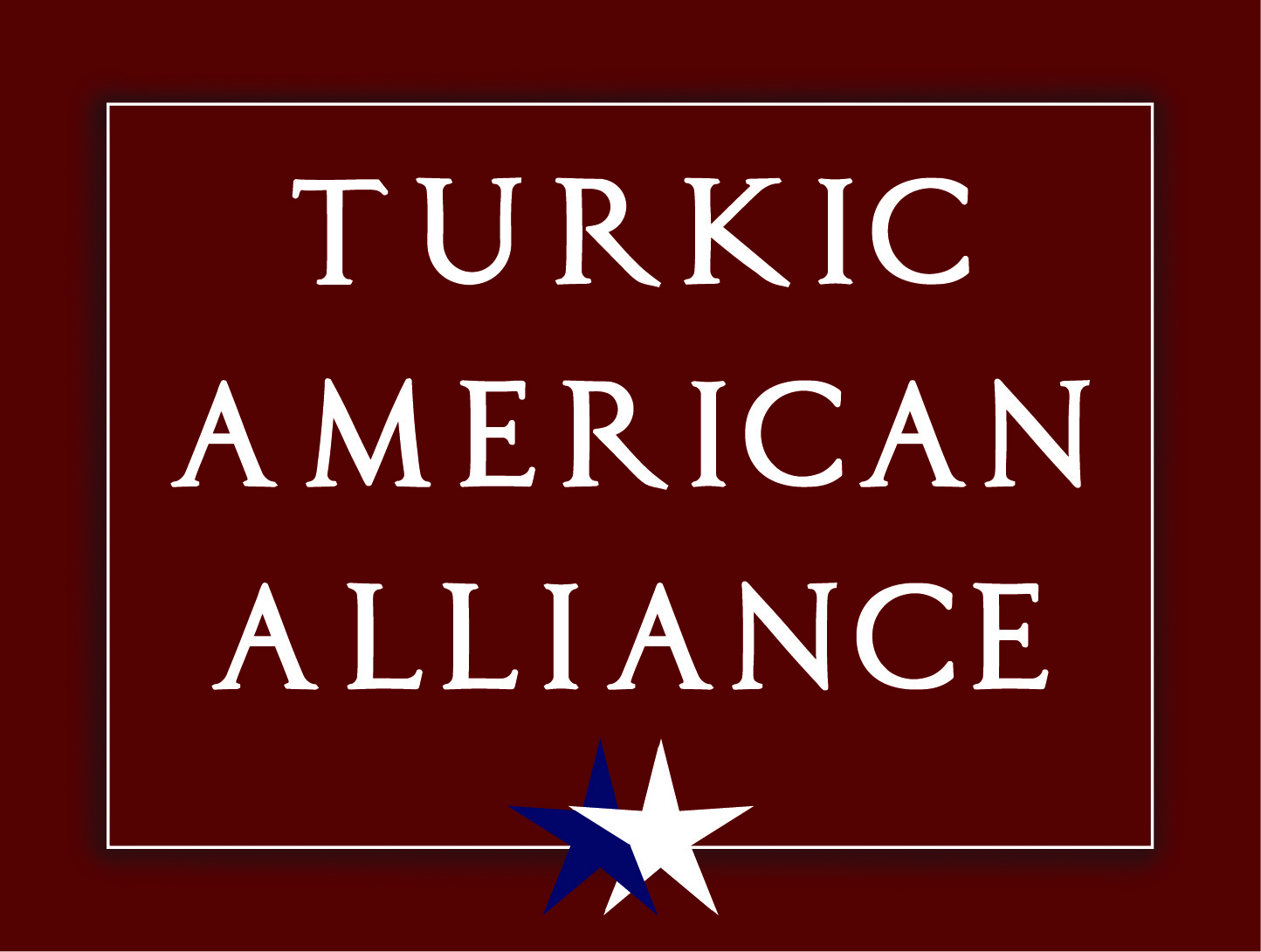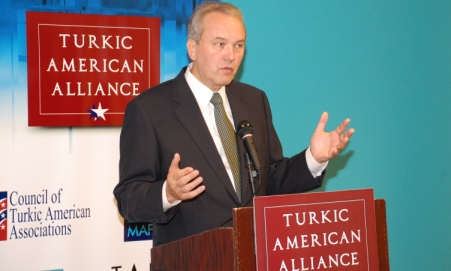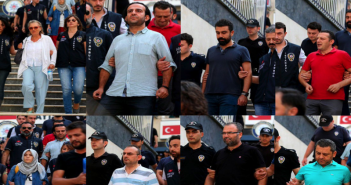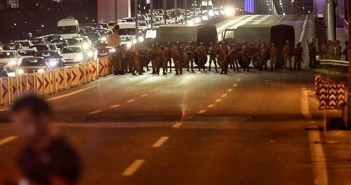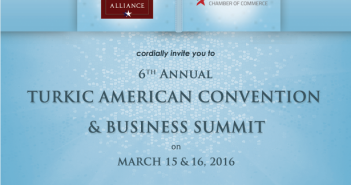TAA organized Ambassadors Talk Series with Ambassador Roman Kirn of Slovenia today at its headquarters. H.E. Roman Kirn spoke to the audience on a topic entitled “Slovenia’s 20 Years of Independence: Before and After”. TAA’s President Faruk Taban warmly welcomed Ambassador Kirn and introduced him to guests. H.E. Roman Kirn:Thank you very much for kindly introduction. Let me first thank to the Turkic American Alliance for this kind invitation. It is my pleasure to share with you
some thoughts.
We live in such a dynamic world that what we say today is absurd tomorrow. Maybe that is even more important when we speak about a relevant issue that we have the understanding of the past. We only are able to understand the past that we can of course phrase the past to the future. Since a lot of misunderstandings are caused by the way of simplifying historical events. And, as you know Europe and the whole world have undergone deep tectonic changes when we speak historically in the past 20 years.
I wish to talk to you little bit about that. Because, if I speak only about Slovenia I guess it would be too narrow. Wherever I go to states I face the problem of the lack of identity. That’s why I have to put Slovenia first of the map. I wish emphasize that Slovenia is also a result of these tectonic changes that has taken place. I guess everybody is aware of the existence of the country, Yugoslavia which Slovenia was part of it. Not many knew that this was a multinational state that included also Slovenia as a federal state.
Of course, Slovenian political ideas, Slovenian past over establishment of its statehood and nationhood has a longer history. However, only in 1848 during the so-called spring of nations Slovenian political elite was able to design its political program. Then it witnessed a critical moment after the 1st world war, after the dissolution of two big empires as we know Ottoman Empire and also Austro-Hungarian Empire. Slovenia was a part of the Austro-Hungarian Empire. Slovenian political elite was designing its political program decided to join the union of Slavic nations. That was the most critical decision at that time.
So, the Kingdom of Slovenians, Croatians and Serbs created the union that was the roots of the Yugoslavia. Slovenia was 70 years a part of the multinational entity, Yugoslavia. And specifics of this entity that high degree of autonomy was granted by the constitution as well. That is something a critical juncture named its constituent part to make the decision as a state within the Yugoslavia or to the part. I wish to share with you just maybe few moments of what do I understand what critical juncture is. Here, of course we have to embrace and understand development in Europe in 20 years ago.
Late 1980s, when democratic changes started in Europe, when the fall of Berlin Wall happened, countries for many decades ruled by the Soviet Union had started to request their independence and more important request their democratization. This was in fact, request for democratization. Yugoslavia missed that opportunity to come along on the road of democratization. That was the critical juncture when Yugoslavia departed from the processes that so many other countries in the center and Eastern Europe departed from. There was nationalism unfortunately instead of democracy in former Yugoslavia.
To have a better understanding because here and there, even in the United States we have to face some simplification which are trying to suggest that today’s independent days succeeded from Yugoslavia. That is far from the truth. What was critically important at that time was that Yugoslavia lacked basic democratic institutions which would be capable to deal with diversity.
Diversity is something that is not strange to Europe as you know. Quite a number of the European countries going from the North Belgium, Spain, even France, you can go to east our neighbor Canada they all faced this issue of diversity. Yugoslavia was an example of diversity with six republics two provinces three religions and three languages. To manage this diversity one really has to develop political system with democratic institutions which are able and capable to deal with this diversity. If these institutions are lacking of course also if appropriate political culture is lacking and if political leadership is not embracing those ideas you face serious challenges. This was the challenge that the Yugoslavia faced.
Don’t forget, at that time, during the huge changes number of multinational states collapsed. Starting with the Soviet Union however you define that you have an agreement in Almaty which in fact named a peaceful disintegration. All problems even conflicting one that we have witnessed after that dissolution of the Soviet Union were results of course of unsolved issues where brought to the surface after this process was mainly concluded.
The second example was Czechoslovakia of course much easier to doubt with because it was only union of two nations. But what is important here to say is that this does integration, separation took place in a civilized, Greek manner whatsoever cost no conflict in even the latest state.
In case of Yugoslavia, unfortunately this was a violent separation. I will risk the degree of simplifying the issue but saying simply some member of this multinational societies where simply trying to impose their views on how future stage of Yugoslavia. Yugo-Slovenia let’s say more developed economically and also politically because all liberal ideas in fact in former Yugoslavia was started in Slovenia.
The idea of Slovenia first was to democratize the Yugoslavia. Unfortunately, we failed in doing so. Because, late 1980s European Union had already got its momentum and early 1990s there was expected the new wave of EU enlargement that included especially Austria and Sweden which we looked as an example very much.
I would like to share only one detail. In early 1990 before political changes in Yugoslavia started, before first democratic elections took place in Slovenia and other parts of Yugoslavia Slovenian government which has a choice with high degree of autonomy in fact adopted a law which was very similar to the law of Sweden which was melting in the EU, which was so-called “Green Blue”. We passed so-called white book copied by the Swedish example and the basic substance of this legislation was that the government could adopt no lauder grand country to the EU law.
So, you see even the beginning of 1990 Slovenia understood which way we should proceed. Our problem was Belgrade did not understand that. We lacked the capacity honestly to convince Belgrade to embark with greater determination, greater speed to the EU integration. That was of course then where we reached the point, again critical decision. This decision might be compared with the decision in 1918 as I said in the end of the 1st world war when Slovenians had to decide. What they would do? That is to prefer nationhood without statehood. So, we have decided for European perspective. (Rest of the talk will be uploaded soon)
